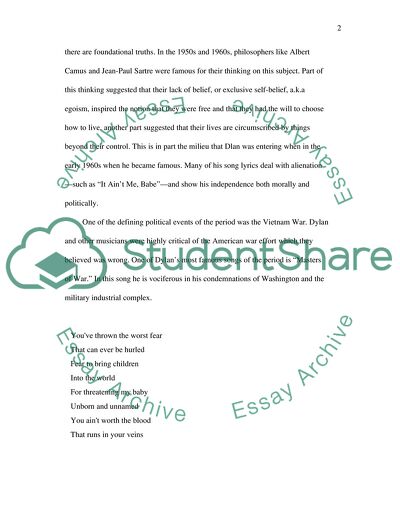
- Home
- Free Samples
- Premium Essays
- Editing Services
- Extra Tools
- Essay Writing Help
- About Us
- Studentshare
- Subjects
- Miscellaneous
- Bob Dylan's Cultural Impact On The Social Society
Bob Dylan's Cultural Impact On The Social Society - Essay Example

- Subject: Miscellaneous
- Type: Essay
- Level: Undergraduate
- Pages: 4 (1000 words)
- Downloads: 0
- Author: denesikrashawn
Extract of sample "Bob Dylan's Cultural Impact On The Social Society"
The age had a specific philosophical and moral background. A lot of traditional ideas were changing and people were becoming less judgemental and more relativistic. Since relativists usually are agnostic or atheists, they might well also call themselves existentialists. This is a very depressing worldview which can mean exactly the same thing as nihilism. There is no meaning to the world. Since God does not exist everything is permitted by everyone. Many relativists might not go this far, but some do.
They take as there starting point the idea that humans live in a world devoid of meaning; and they take this as their starting point because they cannot prove to themselves beyond any doubt (not just a reasonable doubt) that there are foundational truths. In the 1950s and 1960s, philosophers like Albert Camus and Jean-Paul Sartre were famous for their thinking on this subject. Part of this thinking suggested that their lack of belief, or exclusive self-belief, a.k.a egoism, inspired the notion that they were free and that they had the will to choose how to live, another part suggested that their lives are circumscribed by things beyond their control.
This is in part the milieu that Dlan was entering when in the early 1960s when he became famous. Many of his song lyrics deal with alienation—such as “It Ain’t Me, Babe”—and show his independence both morally and politically. One of the defining political events of the period was the Vietnam War. Dylan and other musicians were highly critical of the American war effort which they believed was wrong. One of Dylan’s most famous songs of the period is “Masters of War.” In this song he is vociferous in his condemnations of Washington and the military industrial complex.
The castigating lyrics were a first and were widely played. Dylan masterfully encapsulated the anti-war movement in his rhetoric and probably inspired thousands of people to participate. His political energy was
...Download file to see next pages Read MoreCHECK THESE SAMPLES OF Bob Dylan's Cultural Impact On The Social Society
Music of Joni Mitchell, Album Blue Released in 1971
Is music an entertainment or art
Apex Hides the Hurt: Branding Advertising, Culture and Folkmusic
The Times They Are A-Changin: A Look at the Times that Influenced the Song and Vice Versa
The Influence of Popular Music and Its Use in Propaganda
Rap music's effect on American culture
The Golden Age of the Sixties
The Era of 1960s in America

- TERMS & CONDITIONS
- PRIVACY POLICY
- COOKIES POLICY